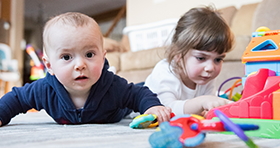
For Consumers
For Consumers
For Consumers
For Consumers
Help protect your baby from severe RSV disease with a few simple steps
You do whatever you can to keep your baby healthy and at home. While severe RSV disease is easily spread, there are a number of simple precautions you can take to help protect your baby during RSV season.
Wash your hands thoroughly before touching your baby, and ask others to do the same
Don't let anyone smoke in your home or near your baby
Wash your baby's toys, clothes, and bedding often

SYNAGIS is a prescription medication that is injected (50 mg and 100 mg) in certain children to help prevent serious lung disease caused by respiratory syncytial virus (RSV). You should know that SYNAGIS is used to prevent RSV, and not to treat children who already have RSV, including children:
SYNAGIS is a prescription medication that is injected (50 mg and 100 mg) in certain children to help prevent serious lung disease caused by respiratory syncytial virus (RSV). You should know that SYNAGIS is used to prevent RSV, and not to treat children who already have RSV, including children:
You Should Know: It is not known if SYNAGIS is safe and works in children who are over 24 months old when they started taking SYNAGIS.
You Should Know: SYNAGIS may cause severe allergic reactions.
You Should Know: SYNAGIS is given by injection. If the child has a problem with bleeding or bruises easily, an injection could cause a problem.
Before the child takes SYNAGIS, you should tell the child’s healthcare provider about all their medical conditions and medicines including vitamins, supplements, and herbal remedies.
The most common side effects are fever and rash.
You Should Know: These are not all the possible side effects for SYNAGIS. For more information, ask the child’s healthcare provider or review the full Prescribing Information for SYNAGIS, including Patient Information.
If you suspect that a child has experienced a side effect, call the child’s healthcare provider. You may also report side effects to Sobi North America at 1-866-773-5274 or the US Food and Drug Administration (FDA) at 1-800-FDA-1088.
AstraZeneca has transferred all rights to SYNAGIS (palivizumab) to another manufacturer, Swedish Orphan Biovitrum AB (SOBI), in January of 2019. If you need SYNAGIS support, please contact SYNAGIS CONNECT® at (866)-285-8419(866)-285-8419.